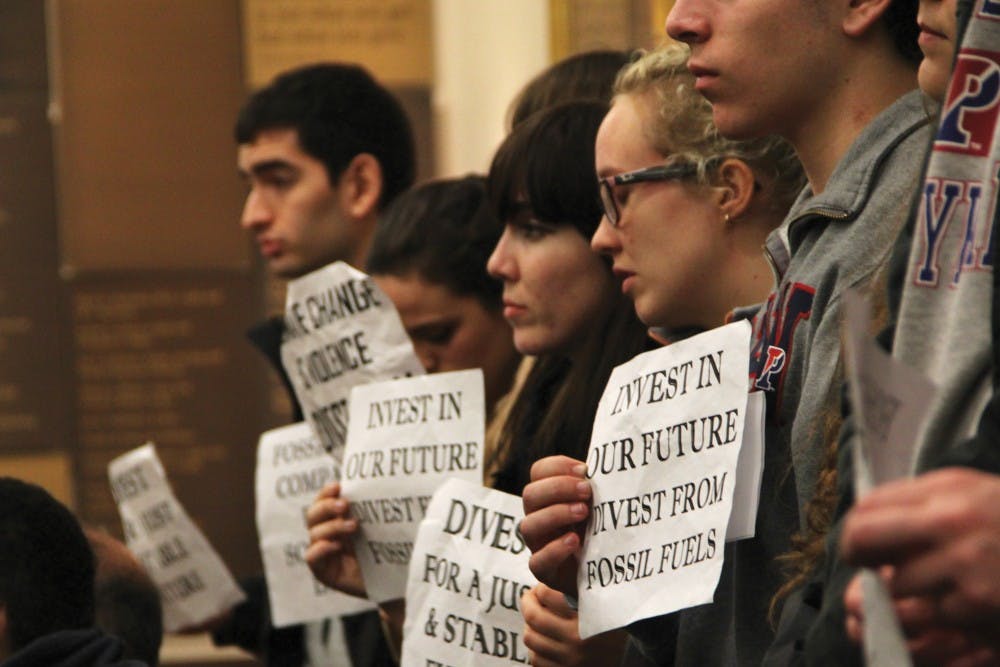
A LEED Certified Comcast Building in Philadelphia located in Philadelphia, Pennsylvania. (CC BY-NC 2.0)
As members of Gen Z, we are left with no choice but to submit ourselves to a lifelong quest for environmental solutions. Although many Penn students feel protected and subsequently removed from climate change effects, the recent onset of the sustainability trend paraded across social media feeds, embedded within marketing campaigns, and embodied by Penn’s green campus initiatives, has brought the issue much closer to home, mobilizing many to join the movement. But how long will it last? And is it really doing enough?
One of America’s favorite trend-setters is Lauren Singer, an environmental advocate known for collecting four year’s worth of trash into a 16oz mason jar — a small-scale protest that has since developed into a popular zero-waste shop in the heart of Brooklyn. Her blog, Trash is for Tossers, spills with eco-conscious tips and waste-free tricks to live simply and eco-consciously — pairing aesthetics with simplicity to form a zero-waste lifestyle that we all desire, regardless of whether we even value the environment at all. Singer and her beautifully-crafted online identity have become an emblem of the sustainability movement, drawing in everyone from our grandmas to our little brothers. Her instagram posts exhibit a white-walled modern kitchen and a counter lined with large jars housing nuts, spices, and colorful seeds and fruits. From reusable razors to shampoo bars, we buy our way into the lifestyle behind the account.
Singer’s platform is just one example of the sustainability trend that hovers over our daily lives. We’re constantly bombarded with ads for recyclable clothes, metal to-go containers, and all-natural shampoos — products that are woven within an ironically extractive system of green consumerism shrouded by eco-friendly labels and good intentions. It has become abundantly clear that companies and institutions are hyper-aware of this new market: Adidas prides themselves with sneakers made of sea-plastic, fast-casual restaurants display B-corps certifications on cashiers, and colleges “go green” with campus-wide composting and recycling initiatives — all tricking themselves into thinking they’re doing enough.

Protest against Penn's investment in fossil fuel companies.
Penn is no exception to this startling paradox. While successfully carrying out an ambitious Climate Action Plan with LEED Gold certified buildings, acres of green spaces, biking maps and repair services, and sustainability-related course offerings, the University actively invests its endowment in fossil fuel companies that significantly contribute to greenhouse gas emissions.
Sustainable initiatives and products, on Penn’s campus and beyond, are ridden with misconceptions and require caution and skepticism from those of us trekking forward on our quest for solutions. The trend of sustainability assumes that “green” products are long-term solutions, rather than just another form of consumerism — that buying green is more important than buying less. It assumes that more than 8 percent of our recycling is actually recycled. That Penn’s 13 percent reduction in carbon emissions from building retrofits is comparable to the hundreds of millions invested in the fossil fuel industry. Most dauntingly, the trend implies that we have more than the United Nation’s 12-year time frame to garner the opposition necessary to dent the profits of Big Oil, Gas, and Coal.
But this is not a pessimistic critique of grassroots movements, as they have brought us radical change in the past. Nor is this a message of blame towards the people, institutions, and companies that engage in the sustainability trend and green consumerism. It is an attempt to help us understand that the problem of climate change and the host of possible solutions require much, much more from us.
How long the sustainability trend will last is open to discretion and debate, and it is reasonable to believe that green consumption, which tricks us into thinking that buying or acting green is the full extent to which we can “do our part,” is holding back the sociocultural transformation that we need to move the needle.
Let us not allow our green consumer choices and lifestyles to become placeholders for public protest and political action that will lift decision-makers off their seats, both at Penn and on Capitol Hill. Because it is these forms of activism that will tackle the larger problems that need our help the most — systemic issues rooted in systems of inequality and injustice, like the influence of Big Oil in politics, or our country’s profit-driven food system that dangerously compromises our waters, forests, and soils.
With the little time we have left, effective solutions will be achieved with Sunrise Philadelphia’s Green New Deal campaign and Fossil Free Penn's demonstrations, and not with metal straws or canvas totes.

MAEVE MASTERSON is a College sophomore from Chicago studying Environmental Management and Sustainability. She is an active organizer for Fossil Free Penn, a cellist in the Penn Symphony Orchestra, and a circular economy enthusiast. Her email address is mmaeve@sas.upenn.edu.
The Daily Pennsylvanian is an independent, student-run newspaper. Please consider making a donation to support the coverage that shapes the University. Your generosity ensures a future of strong journalism at Penn.
Donate







